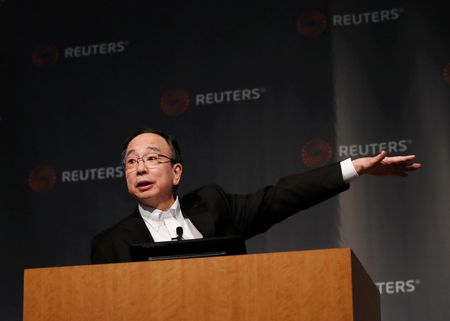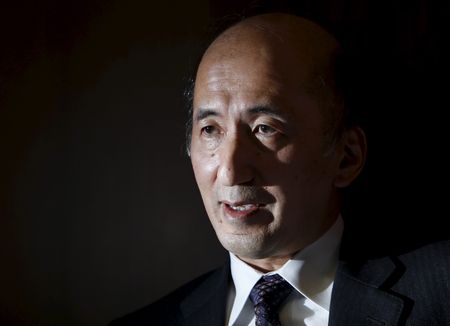By Leika Kihara
(Reuters) – Japan’s government is intensifying its search for a successor to central bank governor Haruhiko Kuroda, a choice that will affect how soon the Bank of Japan (BOJ) could phase out ultra-loose monetary policy.
The Nikkei newspaper reported the government has sounded out BOJ Deputy Governor Masayoshi Amamiya as the next governor, citing anonymous government and ruling party sources.
The government will present a nominee for BOJ governor, and that for two deputy governors, to parliament later this month. Approval by both houses is considered a near certainty due to the ruling coalition’s solid majority.
Kuroda’s term ends on April 8, while those of deputy governors Amamiya and Masazumi Wakatabe expire on March 19.
Below are possible candidates for the posts:
MASAYOSHI AMAMIYA – VERY STRONG CONTENDER FOR GOVERNOR
Currently deputy governor, Amamiya has spent most of his career at the central bank drafting monetary policy ideas and is nick-named “Mr. BOJ” for masterminding many of the bank’s unconventional monetary easing ideas.
He played a key role in drafting Kuroda’s huge asset-buying programme in 2013 and consistently called for keeping ultra-low interest rates. But he also said in July the BOJ must “always” think about the means of exiting ultra-loose monetary policy.
Many market players see a choice of Amamiya as governor as heightening the chance the BOJ will maintain the status quo for the time being and phase out Kuroda’s legacy stimulus only gradually.
An avid fan of classical music, Amamiya is known for his deep contacts with lawmakers and bureaucrats that help him read which way the political wind is blowing in steering policy.
HIROSHI NAKASO – POSSIBLE CONTENDER FOR GOVERNOR
A career central banker who served as deputy governor until 2018, Nakaso played a key role in navigating an exit from the BOJ’s first spell of quantitative easing in 2006.
With long experience overseeing the BOJ’s market operations and international affairs, Nakaso has repeatedly warned of the drawbacks of prolonged monetary easing such as the distortion its huge presence could create in bond and money markets.
Nakaso laid out his idea of an exit from ultra-easy policy in a book published in May. Under that plan, the BOJ would first ditch its 10-year bond yield target, then raise short-term interest rates and finally move to reduce its balance sheet.
Some market players see Nakaso as having dropped out of the BOJ race, after he said last week he has taken up a post heading an Asia-Pacific Economic Cooperation (APEC) advisory council.
HIROHIDE YAMAGUCHI – POSSIBLE CONTENDER FOR GOVERNOR
A career central banker, Yamaguchi served as one of the two deputies of former BOJ Governor Masaaki Shirakawa and played a key role in crafting an asset-buying scheme under which the bank first began purchasing exchange-traded funds (ETF) in 2010.
Since retiring from the BOJ in 2013, he has criticised Kuroda’s stimulus as relying too much on the view central banks can influence public perceptions with monetary policy.
Warning of the rising cost of prolonged easing, Yamaguchi has also called for ending the BOJ’s huge asset purchases and abandoning an yield cap he describes as unsustainable.
TAKEO HOSHI – POSSIBLE DEPUTY GOVERNOR
An economics professor at the University of Tokyo, Hoshi is well-versed in Japanese monetary policy and is a regular member of government panels and the BOJ’s academic workshops.
At one of the BOJ workshops held in November, Hoshi explained how structural changes in Japan’s labour market could push up average wages more than in the past.
“The BOJ must start worrying about the possibility of inflation accelerating more than expected,” he told Reuters, adding the BOJ may abandon its yield cap as early as this year.
FEMALE DEPUTY GOVERNOR CANDIDATES
No female has yet served as BOJ deputy governor or governor, a tradition Kishida may seek to change to enhance diversity.
One possible candidate is Tokiko Shimizu, who rose up the ranks in the male-dominated institution and now serves as executive director overseeing international affairs. People close to her describe Shimizu as dovish on monetary policy.
Other candidates include think tank head Yuri Okina, who calls for phasing out the BOJ’s yield cap, and former BOJ board member Sayuri Shirai, who proposes a review of the current stimulus so the bank can adjust interest rates more flexibly.
FINANCIAL BUREAUCRAT DEPUTY GOVERNOR CANDIDATES
If a former BOJ executive becomes governor, there is a strong chance one of the deputy governor posts will be filled by top finance ministry bureaucrats such as Shigeaki Okamoto and Yasushi Kinoshita.
Kinoshita told Reuters the BOJ should eventually head for an exit from ultra-loose policy, and in doing so must move “cautiously and steadily” to avoid causing huge market turbulence.
Ryozo Himino, a former head of Japan’s financial watchdog, is also considered a dark horse candidate. People close to him describe Himino as critical of the BOJ’s negative rates policy for the damage it is inflicting on commercial banks’ profits.
(Reporting by Leika Kihara; Editing by Sam Holmes and Lisa Shumaker)


